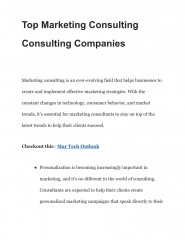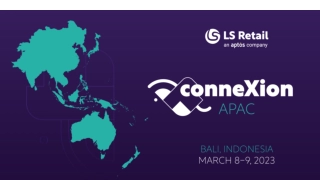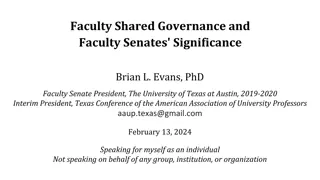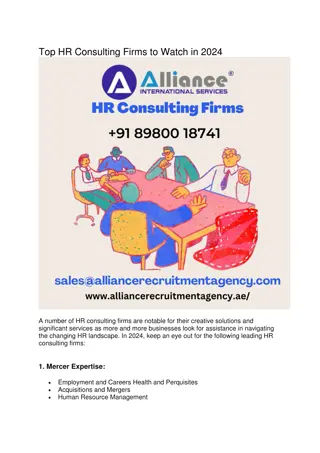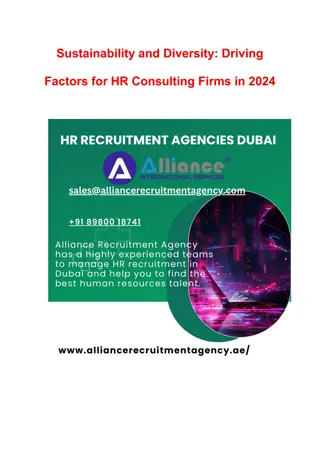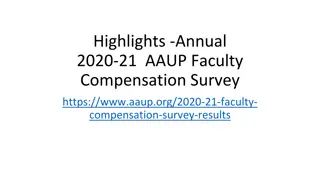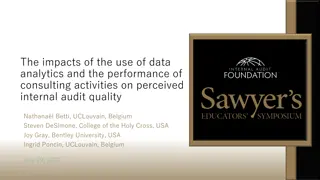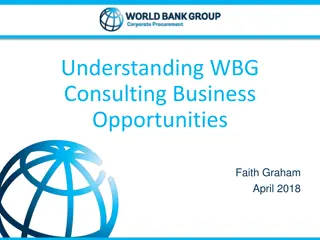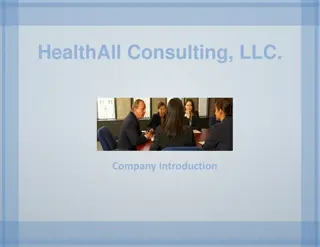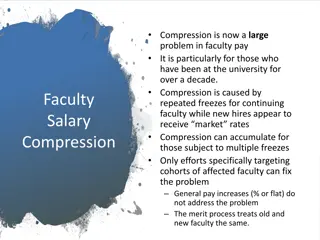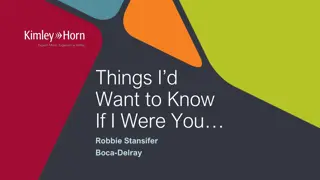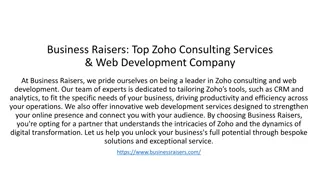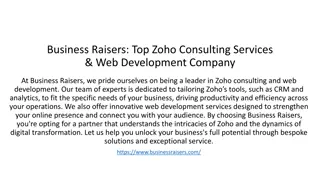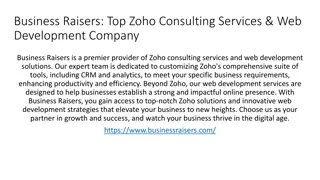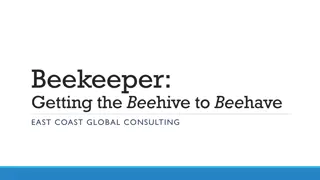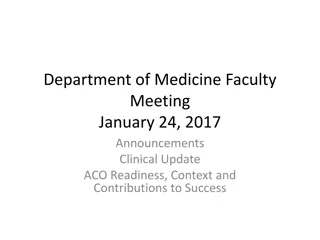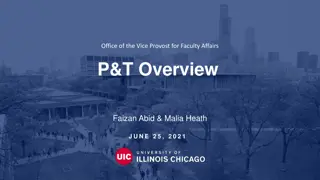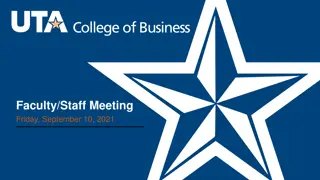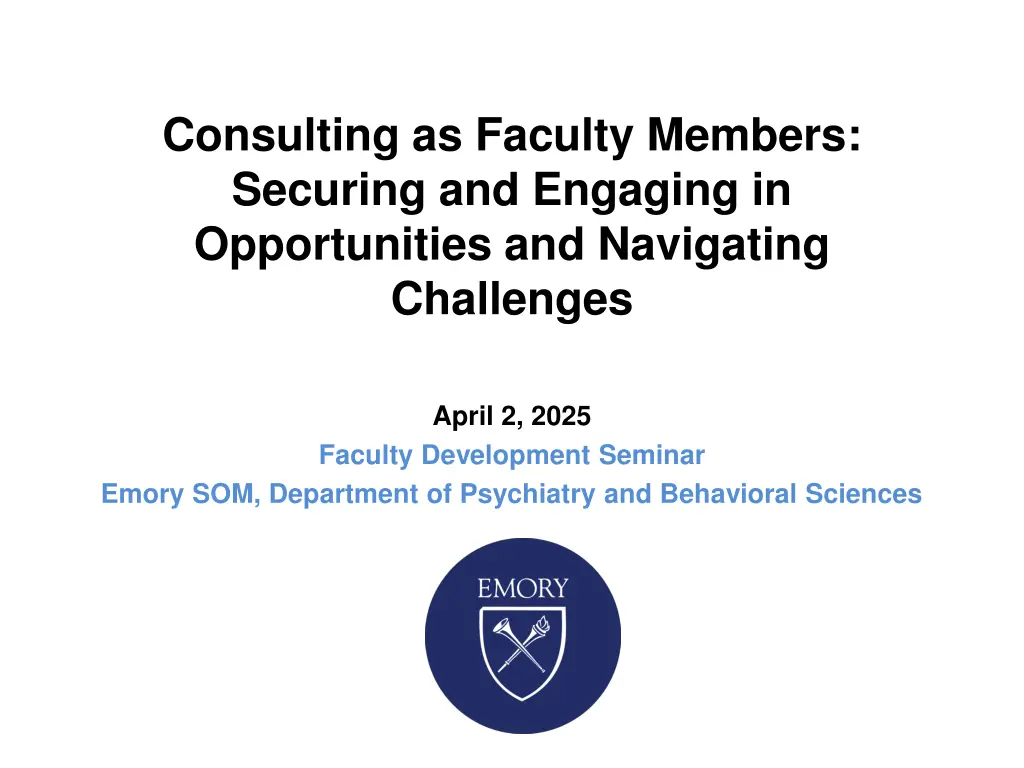
Faculty Development Seminar - Securing Consulting Opportunities and Navigating Challenges
Join the Faculty Development Seminar at Emory SOM to explore securing consulting opportunities and navigating challenges in the field. Learn from expert panelists and get insights into the roles and responsibilities of faculty members engaging in consulting activities. Don't miss this opportunity to enhance your consulting skills and network with professionals in the industry.
Download Presentation

Please find below an Image/Link to download the presentation.
The content on the website is provided AS IS for your information and personal use only. It may not be sold, licensed, or shared on other websites without obtaining consent from the author. If you encounter any issues during the download, it is possible that the publisher has removed the file from their server.
You are allowed to download the files provided on this website for personal or commercial use, subject to the condition that they are used lawfully. All files are the property of their respective owners.
The content on the website is provided AS IS for your information and personal use only. It may not be sold, licensed, or shared on other websites without obtaining consent from the author.
E N D
Presentation Transcript
Consulting as Faculty Members: Securing and Engaging in Opportunities and Navigating Challenges April 2, 2025 Faculty Development Seminar Emory SOM, Department of Psychiatry and Behavioral Sciences
Panelists Rachel Ammirati Peter Ash Claire Coles Molly Millians Brandon Kitay Mar Sanchez Justine Welsh
Roles/Responsibilities - Rachel Ammirati Unified Protocol Institute, LLC Role (paid): Lead Expert Trainer and Consultant Provide consultation to UPI on improving trainings, UP adherence criteria, creation of assessment materials Conduct UP trainings on behalf of UPI (with individuals and organizations) Trainings in standard UP Consultation to trainees on UP adaptations/implementation *UP = Transdiagnostic CBT designed to address neuroticism/lots of comorbidity
Roles/Responsibilities Peter Ash Current consultations: GA Board to Determine Bar Fitness (a commission of the GA Supreme Court) Various attorneys, law firms, and litigants (expert witness) Past consultations: Various GA government committees and task forces U.S. Dept. of Justice
Roles/Responsibilities Claire Coles Current/Recent Consulting University of New Mexico, Alcohol Center, FAS Program, Professional Advisory Board, 2008-2024 University of California at San Diego, Collaborative Initiative on Fetal Alcohol Spectrum Disorders, Russia/Ukraine, 2007-2022, Consultation on infant assessment and intervention. University of Alberta, Edmonton, Alberta, Canada, 2010-2018, MILE in the Schools. Galaxo-Smith Klein, consulting regarding neurobehavior assessment of impact of potentially teratogenic drugs, 2019-2020. BOOST-HR Expert Panel (Use of Big data apprOaches fOr Safe Theraputics in Healthy Pregnancies, 2023-present Center for Truth in Science, Acetaminophen Review, 2024 Various Grant Proposals, University of Geogia, North Carolina, Stanford Legal: Expert Witness, other legal cases, in past; Usually refuse such cases but have done some Refuse: Chemical company, to testify against another researcher
Roles/Responsibilities Molly Millians Current Consultations Families Moving Forward (FMF) Connect Pro with University of Rochester o Developed training curriculum for mental health providers about school issues related to Fetal Alcohol Spectrum Disorders (FASD) o ECHO Hub Team Member for bi-weekly trainings Past Consultations Grants-Cibola County Schools, New Mexico o Teacher and staff training on FASD o Attended IEP team meetings to assist with interventions for FASD American Academy of Pediatrics o Content development and tip sheets related to educational care and role of pediatricians University of Alberta, Edmonton, Alberta, Canada, 2010-2018, MILE in the Schools US Department of Health and Human Services/CDC Prenatal Exposures and Social Service Providers content provider
Roles/Responsibilities Brandon Kitay Current consultations: Pharmaceutical Consulting: Boehringer Ingelheim, Senseye Technical consultant, Collaborative Family Healthcare Association, Integrated Behavioral Health Expert witness (medical defense) Expert consultant, out-of-state medical board Content expert/presenter: AMA BHI Collaborative, UW AIMS Center Past consultations: Scientific Advisory Boards: Janssen Pharmaceuticals, Boehringer Ingelheim, Otsuka Pharmaceuticals, Sage Therapeutics/Merck Private equity investment firm PychU National Forum, session chair
Roles/Responsibilities Mar Sanchez Current Consultantships/Advisory Boards Society for Neuroscience (SfN) representative, Board of Directors, American Brain Coalition (ABC), 2022-2025. o ABC is a nonprofit organization comprising US patient advocacy and organizations. Goal: Education and advocacy related to brain health with public and policymakers. o Voting member representing SfN. o Participates in advocacy initiatives, webinars, panels and public outreach Member, Faculty Advisory Board (FAB) for the Office of Research Administration (ORA), Emory University, 2023-present. o Provides recommendations for improvements of processes and policies (e.g. for OSP, IACUC, Office of Research Compliance, etc) from the research faculty perspective. Past Consultantships/Advisory Boards Member, Board of Trustees, Association for Assessment and Accreditation of Laboratory Animal Care (AAALAC) International, 2015-2016. o Voting member representing the Society for Neuroscience. Consultant in NIH research grants (R01, R21, P50, etc): Typically unpaid.
Roles/Responsibilities Justine Welsh University of California Irvine- Train New Trainers, Primary Care Training and Education in Addiction Medicine 15% of my time above and beyond full time at Emory Work done also counts towards promotion Consulting: NIH/SAMHSA grants Mostly out of GSU Often just teaching role UpToDate Compensated for authorship WCG Applied Clinical Intelligence- Prior Adjudicate potential cases of misuse of study drugs use MADDERS No interface with the actual pharmaceutical company Difficult to explain when publishing Decline: Expert Testimony, don t want to be pulled into court
Question 1: How did you get connected to consulting opportunities?
Rachel Ammirati Professional development efforts + strong professional relationships = opportunities o Used faculty development funds to participate in Level III Unified Protocol (UP) Training through the UP Institute o Focused on developing a reputation as someone with expertise in teaching/delivering the UP o Stayed in touch with the individual who trained me/collaborated on unpaid UP-related trainings/projects
Claire Coles I have never sought out any consulting opportunities. These have always been the result of professional contacts. In the case of GSK, I was recommended to them by a colleague at the Organization of Teratology Information Specialists (OTIS), which is probably the source of the BOOST-HR referral, as well. Several things resulted from being on committees or people who were aware of my publications.
Molly Millians Other professionals in the field Giving Presentations Networking at Conferences
Brandon Kitay Mentors Networking at conferences Networking at other consulting activities* (consulting begets more consulting) Advertising content expertise
Justine Welsh Mentors, other collaborators at Emory
Question 2: Who have you found helpful to talk to about such opportunities and ways to get COI approval for them?
Rachel Ammirati Director of Faculty Affairs Administration, Dean s Office, Emory SOM (Was Zainab W. Harvey, JD; Now Nicole Tannebaum, JD, MSPH) Faculty mentors
Brandon Kitay Director of Faculty Affairs Administration, Dean s Office, Emory SOM (Was Zainab W. Harvey, JD; Now Nicole Tannebaum, JD, MSPH) https://rcra.emory.edu/coi/ecoi.html Faculty mentors
Question 3: How have you made decisions about your role (e.g., PI vs consultant, consultant vs money to the institution)?
Rachel Ammirati I ve done what the Director of Faculty Affairs Administration advised me to do E.g., Ultimately proposed different role title than what I was offered E.g., Declined offer to be given a percentage of the UP Institute s annual profits E.g., Conduct work outside of compensated Emory/Grady time and make clear that work done on behalf of the UPI is separate from Emory position (but ok to mention Emory in bio info) I also thought about how challenging I wanted the approval process to be E.g., Decided that I would dedicate no more than 240 hours (30 days) per year to UP Institute work and wrote this into my contract Considered my long-term professional goals when negotiating how much I'd get paid for my work (i.e., pay vs other UP-related opportunities relevant to career development/promotion)
Brandon Kitay Pharmaceutical or medical device company work: Yes, I always consider, "would I rather be doing research with this entity" or "are they asking me questions that are better suited to a research proposal" -- you can have FTE/research program support or supplemental income, but typically not both. IF you are both consulting and conducting research on behalf of the company, you will need to work with your institution to develop a conflict-of-interest mitigation plan. Also be aware that different academic institutions have different significant conflict of interest thresholds ($X/per year that must be declared to the institution)
Molly Millians Consider the project role/expectations Consider level of interest Consider if learning experience or expansion of professional skills Monetary if research does the role and time demands fit as a Co-investigator or collaborator or better as independent consultant
Mar Sanchez For Advisory Boards and Boards of Directors: - All these are Service roles (a.k.a. unpaid). They are important leadership roles that were offered to me by Emory University or professional societies. - Accepted because of my interest in Service and participation in the decision process within organizations. - I love participating in advocacy in Congress and public outreach. For NIH grants Consultant roles: - Decision is based on % effort required (<10 hours/month) versus co- Investigator or PI. - Does not require to run research studies, just advise others about their studies.
Question 4: How was your consulting agreement structured, including scope of work, deliverables, compensation including rates, timeline, etc.?
Peter Ash - For forensic cases, I have variable fees and charge by the hour: highest rates for civil work involving $$, lower rate for government entities, lowest rate for individuals paying out of pocket (e.g., custody evaluations) - Depending on the case, payment is expected in advance or may be billed after work is done (if I'm sure I'll get paid) - Some attorneys have their own forms that you sign. - For non-forensic work, agreements vary depending on the nature of the work.
Brandon Kitay Scientific Advisory Boards typically limited in scope to a single event, paid hourly +/- travel, with pre-defined deliverables. Open-ended Consulting less structured, perhaps "discovery" focused or an iterative process; scope of work is defined by general deliverables over a pre-defined period (yearly) and an hourly rate with a maximum allowable billable hours. Often renewed on a yearly basis. Consulting fees: based on "market rate" accounting for years of experience and level of expertise (they may ask you to consult from the perspective of someone with limited expertise). Equity: depends on the company/product, but will require negotiation with Emory in mind and equity typically creates opportunity for future conflict of interest.
Claire Coles Some of these things were relatively informal, being on a Scientific Advisory Board, for instance, others were parts of grants, like the Ukraine consulting for UCSD. Others, like the GSK, were quite formal and involved contracts with very clear specifications for deliverables, specific questions to address, number of hours and payment, etc. In such cases, the timeline was specified, as well. These were formal contracts.
Justine Welsh Depends on which agreement UC Irvine- hours/year with itemized list of deliverables including lectures, conference planning and mentorship groups Renewable by year, compensation by hour based on typical salary of an MD (broken down into hour) Above and beyond salary at Emory, although they can also buy out time which would then include benefits WCG/ACI Madders Was per hour Changed to flat rate per case (could be hundreds of pages to skim through)
Mar Sanchez For Advisory Boards and Boards of Directors: - These are unpaid roles. - Received invitation to join the Board - Typically they required attending monthly meetings and participating in initiatives/events and generating reports For NIH grants Consultant roles: - Typically unpaid Consultant roles, because of the low % effort required (10-20 hours/year). - Requires Letter of Support, Institutional agreement, COI. - For paid Consultant roles, the Letter of Support and Institutional agreement state the professional consultant fees (e.g. $100/hour) and total annual Consultant fees. An annual invoice is sent to the grant PI.
Question 5: What have been the barriers/challenges to doing consulting work (e.g., getting Emory approval, financial disclosures, IRB, gauging and being able to devote level of effort) and how have you overcome these?
Peter Ash - In my experience, Emory will not approve o Consulting to plaintiff in a malpractice case in Georgia or a neighboring state. o High profile cases that might prove embarrassing if associated with Emory (e.g., National Enquirer libel claim) o Some consultations to third party payors
Claire Coles When I was making a contract with another organization, I have always discussed it with the chair and completed the COI process with Emory. I always disclosed the amount I was being paid. This was never really a barrier. IRB was never really an issue. As for the effort involved, I did not use Emory compensated time to carry out activities. I would use leave or weekends. If it appeared that more time would be required than I had available, I did not agree to the project. (As for judging time commitments, I have a lot of experience in figuring these out from writing grants)
Brandon Kitay Finding time to participate, especially if travel is involved. Approval by Emory for certain activities, especially anything that involves recording. Managing conflict of interest. Consider future opportunity costs.
Justine Welsh Amount of time Emory allows IP language Financial disclosures, especially with WCG on publications
Question 6: What factors have led/would lead you to decline a consulting opportunity?
Peter Ash - For expert witness work, limited expertise or experience in the particular area the case involves, in which case I usually provide names of experts with expertise in that area. - For other types of consultation, general level of interest and time commitment required
Brandon Kitay - Ethical concerns - Concerns for generating future conflicts of interest - Limited subject matter expertise or I believe there is a colleague better suited to the opportunity - Lack of alignment on compensation : effort - Request for insights that are specific to Emory operations
Claire Coles I have declined projects for the following reasons: o I did not feel qualified to undertake them o I did not have time to devote to them o I did not agree with the goals of the project ( for example, I have been asked to testify on a number of legal cases when I did not think that I could do so ethically. Once by chemical company who wanted to sue one of my professional colleagues about their research on PCBs and birth defects.) o I did not think that I could contribute in the way that the party wanted. For example, in a legal case in which a hospital wanted to argue that the death of an infant was due to prenatal alcohol use rather than their malpractice. -

